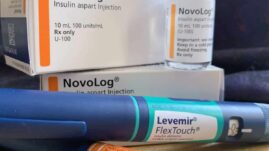For the majority of users, metformin is effective and well-tolerated. But if you are experiencing severe or persistent side effects, or if metformin simply isn’t working for you, you may wonder if there are other options.
The answer is yes. This article will investigate the best alternatives to metformin for people with type 2 diabetes.

Key facts
- While an effective treatment for many, metformin can cause side effects, such as gastrointestinal issues, and it may have negative interactions with other common medicines.
- In some cases, metformin is not effective in managing blood glucose levels or is not advised because of health conditions or insurance coverage limitations.
- Several classes of diabetes medicines offer different mechanisms of action and benefits for managing type 2 diabetes. These alternatives may be more suitable for people who cannot tolerate metformin or find it ineffective.
- Each alternative class of medication comes with its own set of potential side effects, ranging from gastrointestinal issues to risks of hypoglycemia and weight gain. Understanding these effects is vital for selecting the most appropriate treatment option.
- Along with medication, lifestyle modifications such as increased physical activity and dietary changes can be effective in managing type 2 diabetes.
Table of Contents
Why would you not take metformin?
Metformin helps better manage blood sugar levels, fight insulin resistance (a condition in which the body does not use insulin efficiently), and can even help with weight loss. Most guidelines recommend it as the first-line treatment for type 2 diabetes.
It is also very affordable and generally effective, but that effectiveness can come with a cost: side effects.
Side effects
Metformin can cause a variety of potentially detrimental side effects, including:
- Diarrhea (varying from mild to severe)
- Flatulence (passing gas)
- Nausea or vomiting
- Bloating and constipation
- Stomach discomfort
- Heartburn
- Headache
- Decreased appetite and weight loss
- Muscle pain or cramping
- A metallic taste in the mouth
- Hypoglycemia (low blood sugar), especially when taken with insulin
- Vitamin B12 deficiency
- Lactic acidosis
For some people who have strict work or school schedules, enduring some of these side effects may not be possible.
Additionally, experiencing these side effects can also impact other areas of your life. Dealing with chronic gastrointestinal issues, for example, can become an obstacle to eating well or prevent you from maintaining a regular exercise habit.
Contraindications
In other cases, people may avoid taking metformin because it is contraindicated (not advised) to take with many other common prescription drugs. (Here is an overview of the drugs that may interact with metformin.)
Sometimes, it’s impossible to stop taking another medicine that negatively interacts with metformin, and a substitute is necessary.
Ineffectiveness
And for some people, metformin simply is not effective. It does not help everyone better manage their blood sugars, lower their HbA1c levels (a measure of glucose control over the previous 2 to 3 months), or lose weight. Some people even gain weight when taking metformin.
Insurance or lifestyle considerations
Finally, some people may opt not to take metformin because their health insurance doesn’t cover it or they wish to manage their diabetes without the use of pharmaceuticals.
What are alternatives to metformin?
The following are some alternatives that you can discuss with your doctor.
(Remember to always work with your healthcare provider before making any changes to your diabetes management.)
Sulfonylureas
Sulfonylureas are oral diabetes medications that are generally taken with or before a meal. They work to lower blood sugar by increasing the production of insulin from the beta cells in the pancreas. These pills are usually either taken once a day before breakfast or twice daily, before both breakfast and dinner.
Sulfonylureas include:
- Glipizide (brand name Glucotrol)
- Glimepiride (Amaryl)
- Glyburide (Diabeta, Glynase)
Sulfonylurea side effects
Some possible side effects include:
- Hypoglycemia (low blood sugar)
- Weight gain
- Hunger
- Gastrointestinal issues, such as upset stomach
Thiazolidinediones (TZDs)
TZDs are an oral class of type 2 diabetes medication that increases insulin sensitivity and helps decrease glucose production by the liver.
They are easily accessible and affordable and do not have a high risk of causing hypoglycemia.
Thiazolidinediones include:
- Pioglitazone (Actos)
- Rosiglitazone (Avandia)
Thiazolidinedione side effects
Some possible side effects include:
- Weight gain
- Increased risk for heart disease
- Edema (swelling) of feet, legs, arms, and hands
- Increased risk for bone fracture
DPP-4 inhibitors
DPP-4 inhibitors lower blood sugar and HbA1c levels without causing low blood glucose (unless taken with other medicines that can cause hypoglycemia, such as insulin or sulfonylureas).
They function by interfering with the breakdown of two hormones in the body, GLP-1 and GIP, that reduce blood glucose levels.
These hormones are typically broken down very quickly. By helping slow this process, DPP-4 inhibitors allow the hormones to function for longer, lowering blood sugar levels only when they are elevated.
These drugs are taken orally, often in combination with metformin, but they can be taken without metformin as well.
Read more in: Metformin Combination Drugs for Type 2 Diabetes.
DPP-4 inhibitors include:
- Sitagliptin (Januvia)
- Saxagliptin (Onglyza)
- Linagliptin (Tradjenta)
- Alogliptin (Nesina)
DPP-4 inhibitor side effects
Possible side effects include:
- Low blood sugar, if taken along with insulin or sulfonylureas
- Gastrointestinal issues like upset stomach
- Increased risk for pancreatitis (inflammation of the pancreas)
- Fever, body aches, and other flu-like symptoms
GLP-1 receptor agonists
GLP-1 receptor agonists can either be taken orally or through an injection (either once a day or once weekly), depending on the specific medicine used. They function similarly to the GLP-1 and GIP hormones in the body that lower insulin levels but are more resistant to being broken down.
In addition to lowering blood sugar and HbA1c levels, some of these medicines also protect against heart disease.
Notably, although they are not weight-loss drugs, GLP-1 receptor agonists can aid with weight loss. According to the Mayo Clinic, studies indicate that all GLP-1 drugs can lead to a total weight loss of between 10.5 and 15.8 pounds.
GLP-1 receptor agonists include:
- Exenatide (Byetta, Bydureon)
- Liraglutide (Victoza)
- Dulaglutide (Trulicity)
- Semaglutide (Ozempic)
- Lixisenatide (Adlyxin)
GLP-1 receptor agonist side effects
Possible side effects include:
- Nausea
- Vomiting
- Low blood sugar levels (if taken in combination with insulin)
- Decreased need for insulin, if on insulin therapy
- Diarrhea
- Weight loss
SGLT-2 inhibitors
SGLT-2 inhibitors are a class of oral medication, generally taken daily, used to lower blood sugar levels and HbA1c levels by causing the release of excess glucose in the urine. They rarely cause low blood sugar.
These medications can protect against heart failure and improve outcomes in people who have heart disease, kidney disease, or heart failure.
SGLT-2 inhibitors include:
- Canagliflozin (Invokana)
- Dapagliflozin (Farxiga)
- Empagliflozin (Jardiance)
- Ertugliflozin (Steglatro)
SGLT-2 inhibitor side effects
Possible side effects include:
- Frequent urination
- Increased frequency of urinary tract infections (UTIs)
- Increased risk for kidney damage
- Increased risk for diabetic ketoacidosis (DKA)
- Dehydration
- Thirst
- Low blood pressure
- For Invokana, specifically, increased risk of amputations
GIP/GLP-1 receptor agonists
The first medicine in this class was approved in 2022. It is an injectable drug taken once weekly, and it functions by mimicking the actions of both GLP-1 and GIP to help lower blood sugar levels.
Research indicates that this medication leads to an average weight loss of about 15 percent to 20 percent.
GIP/GLP-1 receptor agonists include:
- Tirzepatide (Mounjaro)
GIP/GLP-1 receptor agonist side effects
Possible side effects include:
- Gastrointestinal issues
- Hypoglycemia, particularly when used with another medicine that can cause low blood sugar such as a sulfonylurea or insulin
- Weight loss
- Pancreatitis
- Changes in cholesterol and triglyceride levels
- Kidney issues
- Fatigue and dizziness
Insulin
Insulin has been a cornerstone in diabetes therapy since its discovery in 1921. In type 2 diabetes, it is often used when other medicines do not provide adequate blood sugar control.
The goal of insulin treatment is to mimic the body’s natural insulin production. It is administered via injection, infusion (from an insulin pump), or inhalation. The different types of insulin vary in onset, peak times, and duration of action.
Some of the more common insulins used in the United States include:
Rapid-acting insulin
- Insulin lispro (Humalog, Admelog)
- Insulin aspart (NovoLog, Fiasp)
- Insulin glulisine (Apidra)
Short-acting insulin
- Regular human insulin (Humulin R, Novolin R)
Intermediate-acting insulin
- NPH (isophane) insulin (Humulin N, Novolin N)
Long-acting insulin
- Insulin glargine (Lantus, Basaglar, Toujeo)
- Insulin detemir (Levemir)
- Insulin degludec (Tresiba)
Possible side effects
- Hypoglycemia, particularly if the insulin dose is not balanced with food intake and physical activity
- Weight gain
- Changes in fat tissue at injection sites
- Allergic reactions, ranging from local injection site reactions to systemic ones
- Swelling of arms and legs
- Insulin resistance, especially with higher doses over time
Less-commonly used alternatives
Alpha-glucosidase inhibitors
The starches you eat are broken down into sugars by your body. Alpha-glucosidase inhibitors help lower blood sugar levels by blocking the digestion of starches. They are taken with the first bite of each meal.
Alpha-glucosidase inhibitors include:
- Acarbose (generic only)
- Miglitol (Glyset)
Alpha-glucosidase inhibitor side effects
Common side effects include:
- Gastrointestinal issues such as gas and diarrhea
Meglitinides
Meglitinides are a type of oral medication that stimulates the insulin-producing beta cells of the pancreas to release insulin. They are taken before each meal to help lower after-meal blood glucose levels.
Meglitinides include:
- Repaglinide (Prandin)
- Nateglinide (Starlix)
Meglitinide side effects
Common side effects include:
- Hypoglycemia
- Weight gain
Lifestyle changes
Finally, adopting healthy lifestyle changes is always a good approach, whether or not you are taking medication. Engaging in regular physical activity and eating a balanced, nutritious diet can help manage blood sugar levels, lower your HbA1c, and potentially lead to weight loss as well.
This may be the cheapest option, but it can be hard to maintain. And it’s also not guaranteed that lifestyle changes will allow you to stop taking medications.
Other factors, such as a genetic predisposition for diabetes, can make medication necessary, even if you are in great physical condition and otherwise healthy.
Talk with your doctor and meet with a registered dietitian (RD) to develop an exercise and eating plan that will work for your lifestyle and health goals.






Paul Stansby
My metformin prescription is useless but that’s what the NHS have , I have had my spectrograph, not so good. I’m averaging 17 plus mmol/L with my diabetes over six months, any ideas, maybe go private ?
Pendragon
Can I ask about the effectiveness of Berberine as a blood sugar reducing remedy. Thanks.
Christel Oerum, MS
Berberine is not a FDA approved supplement, so there are no confirmed medical claims to it. Some people see good results though. You can see a first hand experience in the latest Diabetes Strong YouTube video: https://youtu.be/l5P3DKJZWUs?si=s3qLkuNX77Pk5ERS
AH
I cannot take any diabetes medicine besides insulin because I have severe gastroparisis. All the meds cause slowing of digestion and with gastroparisis my stomach movement is almost non existent by itself.
Melek Zambak
I am type 2 diabetes almost 18 years and I have been taking ozempic shot since july 1st, 2019. I got ver indigestible stomach issues slowing digestion, feeling full and badly constipation. I went to lots of doctors abdominal ultrasounds, CT scan, Emar and second opinion of Stomach doctors lab stool work nothing found series in my health only small polips on my gallbladder. I have little high cholesterol and triglyceride but I was taking lipid cholesterol lowering medicine 20 mg per day. I had heart burn and taking omeprazole 20 mg. Ozempic gave bad side effect in 3.5 years. I was suffering stomach gas a lot constipation worse. This medicine is very very expensive but side effect is very bad.